
Text and links to all ancillary materials for Module 54
- Subject:
- Psychology
- Social and Behavioral Sciences
- Material Type:
- Module
- Reading
- Teaching/Learning Strategy
- Author:
- Brad J
- Date Added:
- 05/31/2021

Text and links to all ancillary materials for Module 54
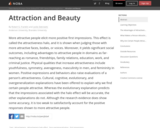
Text and links to all ancillary materials for Module 55

By Brad J. Bushman, The Ohio State University. This module discusses the causes and consequences of human aggression and violence. Both internal and external causes are considered. Effective and ineffective techniques for reducing aggression are also discussed.

By Robert Biswas-Diener, Portland State University. The science of social psychology investigates the ways other people affect our thoughts, feelings, and behaviors. It is an exciting field of study because it is so familiar and relevant to our day-to-day lives. Social psychologists study a wide range of topics that can roughly be grouped into 5 categories: attraction, attitudes, peace & conflict, social influence, and social cognition.
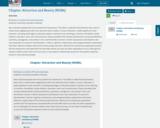
By Robert G. Franklin and Leslie Zebrowitz, Anderson University, Brandeis University. More attractive people elicit more positive first impressions. This effect is called the attractiveness halo, and it is shown when judging those with more attractive faces, bodies, or voices. Moreover, it yields significant social outcomes, including advantages to attractive people in domains as far-reaching as romance, friendships, family relations, education, work, and criminal justice. Physical qualities that increase attractiveness include youthfulness, symmetry, averageness, masculinity in men, and femininity in women. Positive expressions and behaviors also raise evaluations of a person’s attractiveness. Cultural, cognitive, evolutionary, and overgeneralization explanations have been offered to explain why we find certain people attractive. Whereas the evolutionary explanation predicts that the impressions associated with the halo effect will be accurate, the other explanations do not. Although the research evidence does show some accuracy, it is too weak to satisfactorily account for the positive responses shown to more attractive people.
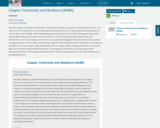
By Jerry M. Burger, Santa Clara University. We often change our attitudes and behaviors to match the attitudes and behaviors of the people around us. One reason for this conformity is a concern about what other people think of us. This process was demonstrated in a classic study in which college students deliberately gave wrong answers to a simple visual judgment task rather than go against the group. Another reason we conform to the norm is because other people often have information we do not, and relying on norms can be a reasonable strategy when we are uncertain about how we are supposed to act. Unfortunately, we frequently misperceive how the typical person acts, which can contribute to problems such as the excessive binge drinking often seen in college students. Obeying orders from an authority figure can sometimes lead to disturbing behavior. This danger was illustrated in a famous study in which participants were instructed to administer painful electric shocks to another person in what they believed to be a learning experiment...

By Jake P. Moskowitz and Paul K. Piff, University of California, Irvine. Humans are social animals. This means we work together in groups to achieve goals that benefit everyone. From building skyscrapers to delivering packages to remote island nations, modern life requires that people cooperate with one another. However, people are also motivated by self-interest, which often stands as an obstacle to effective cooperation. This module explores the concept of cooperation and the processes that both help and hinder it.

By Dennis L. Poepsel and David A. Schroeder, Truman State University, University of Arkansas. People often act to benefit other people, and these acts are examples of prosocial behavior. Such behaviors may come in many guises: helping an individual in need; sharing personal resources; volunteering time, effort, and expertise; cooperating with others to achieve some common goals. The focus of this module is on helping—prosocial acts in dyadic situations in which one person is in need and another provides the necessary assistance to eliminate the other’s need. Although people are often in need, help is not always given. Why not? The decision of whether or not to help is not as simple and straightforward as it might seem, and many factors need to be considered by those who might help. In this module, we will try to understand how the decision to help is made by answering the question: Who helps when and why?
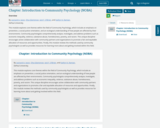
By Leonard A. Jason, Olya Glantsman, Jack F. O’Brien, and Kaitlyn N. Ramian, DePaul University. This module explores core themes within the field of Community Psychology, which include an emphasis on prevention, a social justice orientation, and an ecological understanding of how people are affected by their environments. Community psychologists comprehensively analyze, investigate, and address problems such as economic inequality, violence, substance abuse, homelessness, poverty, and racism. This unique discipline encourages active collaboration with community partners and organizations to promote a fair and equitable allocation of resources and opportunities. Finally, this module reviews the methods used by community psychologists as well as provides resources for learning more about and getting involved within this field.

By Debi Brannan and Cynthia D. Mohr, Western Oregon University, Portland State University. Friendship and love, and more broadly, the relationships that people cultivate in their lives, are some of the most valuable treasures a person can own. This module explores ways in which we try to understand how friendships form, what attracts one person to another, and how love develops. It also explores how the Internet influences how we meet people and develop deep relationships. Finally, this module will examine social support and how this can help many through the hardest times and help make the best times even better.

By Robert V. Levine, California State University, Fresno. This module introduces several major principles in the process of persuasion. It offers an overview of the different paths to persuasion. It then describes how mindless processing makes us vulnerable to undesirable persuasion and some of the “tricks” that may be used against us.

By Susan T. Fiske, Princeton University. People are often biased against others outside of their own social group, showing prejudice (emotional bias), stereotypes (cognitive bias), and discrimination (behavioral bias). In the past, people used to be more explicit with their biases, but during the 20th century, when it became less socially acceptable to exhibit bias, such things like prejudice, stereotypes, and discrimination became more subtle (automatic, ambiguous, and ambivalent). In the 21st century, however, with social group categories even more complex, biases may be transforming once again.

By Rajiv Jhangiani, Kwantlen Polytechnic University. Social psychologists are interested in the ways that other people affect thought, emotion, and behavior. To explore these concepts requires special research methods. Following a brief overview of traditional research designs, this module introduces how complex experimental designs, field experiments, naturalistic observation, experience sampling techniques, survey research, subtle and nonconscious techniques such as priming, and archival research and the use of big data may each be adapted to address social psychological questions. This module also discusses the importance of obtaining a representative sample along with some ethical considerations that social psychologists face.

By Yanine D. Hess and Cynthia L. Pickett, University of California, Davis. Social cognition is the area of social psychology that examines how people perceive and think about their social world. This module provides an overview of key topics within social cognition and attitudes, including judgmental heuristics, social prediction, affective and motivational influences on judgment, and explicit and implicit attitudes.

By Stephen Garcia and Arnor Halldorsson, University of Michigan. When athletes compete in a race, they are able to observe and compare their performance against those of their competitors. In the same way, all people naturally engage in mental comparisons with the people around them during the course of daily life. These evaluations can impact our motivation and feelings. In this module, you will learn about the process of social comparison: its definition, consequences, and the factors that affect it.

By Tiffany A. Ito and Jennifer T. Kubota, University of Colorado Boulder, University of Delaware.This module provides an overview of the new field of social neuroscience, which combines the use of neuroscience methods and theories to understand how other people influence our thoughts, feelings, and behavior. The module reviews research measuring neural and hormonal responses to understand how we make judgments about other people and react to stress. Through these examples, it illustrates how social neuroscience addresses three different questions: (1) how our understanding of social behavior can be expanded when we consider neural and physiological responses, (2) what the actual biological systems are that implement social behavior (e.g., what specific brain areas are associated with specific social tasks), and (3) how biological systems are impacted by social processes.

By Joel A. Muraco, University of Wisconsin, Green Bay. Each and every one of us has a family. However, these families exist in many variations around the world. In this module, we discuss definitions of family, family forms, the developmental trajectory of families, and commonly used theories to understand families. We also cover factors that influence families such as culture and societal expectations while incorporating the latest family relevant statistics.

By Donelson R. Forsyth, University of Richmond. This module assumes that a thorough understanding of people requires a thorough understanding of groups. Each of us is an autonomous individual seeking our own objectives, yet we are also members of groups—groups that constrain us, guide us, and sustain us. Just as each of us influences the group and the people in the group, so, too, do groups change each one of us. Joining groups satisfies our need to belong, gain information and understanding through social comparison, define our sense of self and social identity, and achieve goals that might elude us if we worked alone. Groups are also practically significant, for much of the world’s work is done by groups rather than by individuals. Success sometimes eludes our groups, but when group members learn to work together as a cohesive team their success becomes more certain. People also turn to groups when important decisions must be made, and this choice is justified as long as groups avoid such problems as group polarization and groupthink.

By Edward Diener and Robert Biswas-Diener,University of Utah, University of Virginia, Portland State University.In science, replication is the process of repeating research to determine the extent to which findings generalize across time and across situations. Recently, the science of psychology has come under criticism because a number of research findings do not replicate. In this module we discuss reasons for non-replication, the impact this phenomenon has on the field, and suggest solutions to the problem. Diener, E. & Biswas-Diener, R. (2021). The replication crisis in psychology. In R. Biswas-Diener & E. Diener (Eds), Noba textbook series: Psychology. Champaign, IL: DEF publishers.
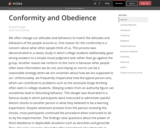
Text and links to all ancillary materials for Module 47